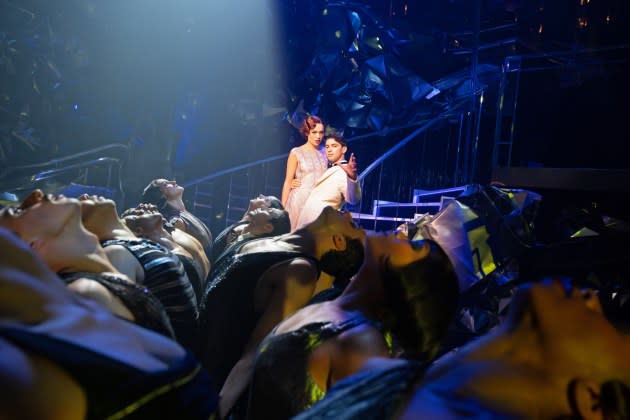‘Gatsby’ Review: A Smartly Stinging Musical Adaptation With Spectacle, Grit and Florence Welch Tunes

For all its jaw-dropping spectacle, and the musical excitement of the tunes by Florence Welch (of Florence and the Machine) and Thomas Bartlett (a/k/a Doveman), the American Repertory Theater’s “Gatsby” never forgets that F. Scott Fitzgerald’s magnum opus is a stinging rebuke of the American Dream. “The Great Gatsby” is obsessed with desire: It’s sickened of the embrace of false values, and the yearning for worldly things that leaves one empty and alone. While many musicals kick off with an “I want” song in which we are alerted to the protagonist’s life goal, “Gatsby” is one big, ensemble “I want,” to which America keeps responding, “Baby, you ain’t gettin’ it.”
Playwright Martyna Majok, our Pulitzer-winning (“Cost of Living”) bard of the underclass experience, is an ideal librettist for Fitzgerald’s social vision. Most adaptations — including the entirely separate musical currently on Broadway — focus on the routine romantic triangle among the mysterious Gatsby (Isaac Powell), bigoted capitalist Tom Buchanan (Cory Jeacoma) and Daisy (Charlotte MacInnes), the one-time Louisville belle for whom they vie. There’s not much there on which to hang an American epic, though many a film and stage play has tried. (And now that the book’s in the public domain, we can expect plenty more.)
More from Variety
Florence Welch Canceled Performances to Undergo Emergency Surgery, Says 'It Saved My Life'
Florence Welch's 'Gatsby' Musical Taps Tony-Winning Choreographer Sonya Tayeh
'Cost of Living' Review: Martyna Majok's Pulitzer-Winning Drama Makes Sensational Broadway Debut
Here, however, three more characters are wisely elevated to principal status. Gas jockey George Wilson (Matthew Amira) represents the ordinary Have-Not plugging along amidst the Haves’ wretched excess. Wife Myrtle (Solea Pfeiffer) is seduced by that drug — excess — into the arms of faithless Tom, to tragic effect. (An invented backstory has the Wilsons mourning the death of a child from flu when they couldn’t afford treatment.) And sardonic golf pro Jordan Baker (Eleri Ward) is turned into a sort of flapper “Cabaret” emcee, egging everyone on to heedlessly test their limits.
These additions — and moments in which ordinary working stiffs are given opportunities to take stage — deepen the critique of the hedonism and cult of celebrity that followed World War I and, it’s suggested, continue to plague us today.
Thematic ambitions, I hasten to add, don’t put a damper on “Gatsby” as an entertainment event. Mimi Lien’s permanent chromium set seems inspired by the book’s ending: crushed automobile parts, with bits of luxury peeping beneath and players marooned on top. But when Alan C. Edwards lights it, it takes on the glamour of a starry Fourth of July, accommodating settings both high and low that slide in from the sides and pop up from beneath. After winning Oscars for colorful frocks on the order of “Shakespeare in Love,” Sandy Powell seems to revel in the opportunity to explore a black-and-white aesthetic that can evoke elegance or deprivation with equal alacrity.
Modern musical idioms, meanwhile, convey Jazz Age orgiastic frenzy to an audience that would be unmoved by “Charleston, Charleston.” Welch and Bartlett’s melodies are full of dark longing, Welch’s lyrics pointed and often witty (when they can be made out, that is). And when those drums start pounding (Bartlett also orchestrated), choreographer Sonya Tayeh’s troupe explodes onto the stage with an amalgam of moves that are part Josephine Baker, part Tayeh’s signature stuttering style from “Moulin Rouge!,” and 100% Cotton Club. These are dancers who really act, whose presence advances the story, as in their “lassitude ballet” accompanying Manhattan apartment dwellers sweltering in the heat.
Still, director Rachel Chavkin (“Hadestown”) never allows the aural and visual elements to overwhelm the indictment of an America lacking in soul, and she elicits nuanced performances across the board. The suave Powell adds just the right touch of roughneck to make Gatsby ever more the outsider. MacInnes’ neurotic Daisy dreams of agency but is hopelessly caught between two narcissists using her to satisfy their own egos. Narrator Nick Carraway is, as usual, a nothingburger of a role, even when wrenched out of the closet, but Ben Levi Ross at least provides presence and welcome comedy relief.
Pfeiffer and Amira’s climactic confrontation is perhaps the evening’s dramatic highlight, and Adam Grupper contributes a showstopper of a flashback as the genial but sinister Wolfsheim, teaching his mentee “James Gatz” how to con the public with an act that “looks like Heaven but feels like Hell.” At a time when one presidential candidate is offering a heavenly vision of a bygone America punctuated by hellish images of a “new Reich,” “Gatsby” couldn’t be any more timely.
Best of Variety
Sign up for Variety’s Newsletter. For the latest news, follow us on Facebook, Twitter, and Instagram.

 Yahoo News
Yahoo News 